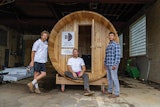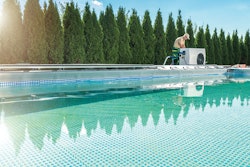
As CEO of the National Swimming Pool Foundation, everything we do helps people live healthier lives. Our products and programs keep pools safer and build demand for pools and spas; our products just happen to be research studies, conferences, books and online courses. I’ve spent the last decade of my working life in the thick of the Foundation’s mission sponsoring and promoting aquatics/health-related research and educational programs.
What if we had data that indicates, if not flat-out proves, that pools and spas provide a great place to recover from surgery, lose weight, reduce hypertension, fight diabetes, sooth fybromyalgia, reverse the effects of arthritis, improve cardio and pulmonary health, slow the aging process and improve cognitive function — and all while having fun with family and friends? If we had such data, do you think we could attract more people to build or install a pool or spa in their backyard? If such data existed, do you think the pool and spa industry would have a prosperous future?
Guess what — such data does exist! Quite simply, it’s our job (of both the NSPF and professionals in this industry) to make sure as many people as possible, both in and outside of the pool industry, hear the message.
I’m very proud of the work we do at NSPF to proliferate this valuable and vast body of knowledge through our various initiatives, which address both keeping pools safer by reducing risks and increasing demand for aquatic activity by promoting healthy upsides. Our goal is to help more people live healthier lives and foster the safe use of pools and spas along with a greater awareness of why literally everyone can benefit from getting wet. The better we promote all that good stuff, the better we are able to support growth throughout the industry.
Make no mistake — NSPF is only one resource among many others joining the chorus. In recent years, the Foundation has had the privilege of partnering with a number of organizations and researchers similarly devoted to spreading the aquatic-health message, including the American Physical Therapy Association, USA Swimming, the Red Cross and the Aquatic Exercise Association, among others, all of which bring different perspectives, resources and skill sets to the discussion.
The broad diversity within the aquatic health community was on full display this past October when NSPF’s World Aquatic Health Conference rolled into Indianapolis for its 10th annual event that has become a dynamic annual gathering of a family of leaders from the aquatics, swimming pool and spa, medical fields and government. Nearly 400 attendees came to absorb a comprehensive litany of presentations spotlighting issues and opportunities that can foster growth.
This year’s event was rich with fascinating information across a range of topics, many that contain brilliant factual nuggets that could and should be used to promote the aquatic experience and lifestyle, ergo pool and spa ownership. The responses we received from attendees were wonderfully positive, and this year, we’ve had a number of sponsors offer support enabling us to make videos of some of the sessions, which are available on the NSPF website.
Most gratifying of all, the vibrancy at the conference is indicative of the energy and resources at work in the field at large. This growing wave of interest, for all of its empirical sophistication, is based on a foundation of ideas that are accessible to everyone in the pool/spa and aquatics industries and anyone who might benefit from swimming and hydrotherapy, which potentially encompasses almost everyone.
If that sounds a touch hyperbolic, consider the fact that for most people, the two biggest priorities in life are health and family. You don’t have to be an academic to know that water-related activities are among the absolute healthiest form of exercise and that an aquatic lifestyle is a great way to foster family togetherness.
Of course, it’s one thing to intuitively believe that swimming is good for you, it’s quite another to prove it scientifically. Exposing the data is one of the greatest gifts the scientists at the WAHC give leaders in our field
As evidence, this year’s conference featured a particularly strong set of presentations supporting a number of those benefits in scholarly terms. Among them was a fantastic discussion from Dr. Joel Stager, professor of kinesiology at Indiana University. Stager’s research and thrilling assertions have focused largely on the “fountain of youth” aspect of swimming. Through comparative analysis of swimmers, particularly master swimmers, as they age compared to people with sedentary lifestyles, as well as people who are more active but don’t swim, he’s come up with evidence that is extraordinarily compelling.
In his presentation, Stager focused on basic physiological markers such as blood pressure, body mass, etc., and also covered data looking at how physical performance diminishes with age. Everything he talked about points to the idea that swimming slows the aging process, while citing previous studies showing that swimming dramatically lowers mortality rates for people at a given age. The effects appear particularly dramatic for people in their 70s and 80s. People in those age groups who swim regularly routinely demonstrate physical capabilities typically associated with much younger people.
Another interesting presentation came from Ray Cronise, who I would consider one of our industry’s more innovative thinkers. He’s beginning research studying the effects of mild cold water exposure on overall health. His work is in the early stages, but his hypothesis is fascinating: that immersion in cold water burns calories, which in turn helps in weight loss and the associated maladies.
How potent is this kind of information? At this year’s conference we asked attendees to identify the two most valuable seminars from a two-track program each featuring nine seminars over two days. All of the 85 survey respondents said they would absolutely or likely discuss what they learned with others. Similarly, more than 95 percent of survey respondents said that the seminars’ influence their thinking or decisions and the information has a dramatic or noteworthy impact.
For as encouraging as all of this is, we still have a long way to go to promote aquatic health benefits. As the data continues to develop, we face not only the challenge of spreading the word about the science, but also combating cultural issues and trends that drive a perception of pools and spas that, for many consumers, doesn’t include exercise and therapy.
I’ll tackle that challenge in my next discussion with a look at something called the “Culture Code.”











































